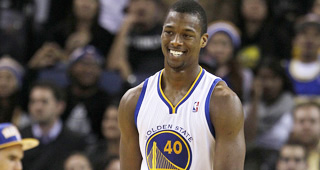With so many teams that could use a player of Harrison Barnes’ profile, there was never any doubt he would sign a (near) max contract that would trigger perfunctory, incendiary reactions. With Kevin Durant taking Barnes' spot with the Warriors, the four-year, $94 million deal Barnes agreed upon with the Dallas Mavericks was immaterial NBA business by comparison and basically a perfectly time 4th of July news dump.
Barnes and the Mavericks seemed dialed in on each other beginning on the second day of free agency, so it is unclear how much competing interest there actually was from rival teams.
The real value in Barnes is that he will hit wide-open spot-up shots at an efficient rate and he can defend three positions. Barnes is not capable of leading an offense in a high volume way, but he can fit into virtually any lineup combination as a traditional small forward or as a small-ball 4. Barnes in a vacuum is a rather pedestrian player, but he certainly assisted in making Golden State special when he was on his game.
But the Warriors also did well without Barnes when he missed more than a month early in the season with a sprained ankle. The Death Lineup was the Death Lineup, but three of their best four lineups in terms of net rating didn’t feature Barnes.
Barnes is not the transcendent talent many expected him to be as a hyped high school kid in Iowa being compared to Tracy McGrady and Kobe Bryant. None of those lead scorer traits are in Barnes’ game or even in his on-court demeanor. Barnes doesn’t have the ball handling or feel for the game to be anything more than a complementary scorer. Barnes had a PER of 12.3 this past season with a True Shooting Percentage of .559, hitting 38.3 percent of his three-pointers.
At the age of 24, there is no All-Star awaiting a bigger opportunity outside the Warriors’ ecosystem. But Barnes is a professional, agreeable player with a fairly clean health history and gives maximum effort to go on top of his versatility.
The Mavericks have needed to get more athletic at forward and moving on from Chandler Parsons to Barnes for the same money makes them about as good in the short-term and much better in the long-term. The Mavericks have needed shot creators off the dribble and Parsons could deliver in that area but only when he was healthy. Barnes’ efficiency as a scorer is roughly similar to Parsons’ even though he is more dependent on others. Barnes' Black Falcon moments will be something the Mavericks haven't seen too often recently.
For a player with a small role on offense, Barnes is fairly reliable in hitting big moment three-pointers, though some of his Finals’ misses provide some recency bias.
Defensively, Barnes’ value is in being able to cover both small forwards and power forwards. Barnes has been taken out of the starting lineup by Steve Kerr against both LeBron James and Kevin Durant in favor of Andre Iguodala at various points over the past few years, but few defenders in the league or as good as Iguodala. Barnes doesn’t have the necessary fluidity to defend high volume wings at an elite level but he's the best option Dallas has had since Shawn Marion.
Dallas is now the NBA's quintessential mediocrity treadmill team. The Mavs haven’t advanced out of the first round since winning the title in 2011, yet they also have no truly foundational young players out of the draft. The strategy is fine if you end up signing Chris Paul, Dwight Howard or DeAndre Jordan, but it is a huge issue when Barnes and Parsons are the consolation prizes.
Grade for Mavericks: B+
Barnes rejected a four-year, $64 million extension offer from the Warriors last fall, which was certainly the wise financial decision. Taking a $30 million discount with the Warriors and then be traded to accommodate Durant would have been an awful result on every level for Barnes.
The expectations will be relatively low for Barnes with the Mavericks as he can fit in beside Dirk Nowitzki. The Mavericks aren’t signing him to be their franchise player or number one option on offense; he’ll be a role player as Mark Cuban continues to chase free agents or finally lets them be bad enough to dip into the lottery.
Barnes figured out how he can be productive and valuable in the NBA as a prototypical combo forward in a way that took Marvin Williams nearly a decade in the league. Barnes will reenter free agency at the age of 28 and will remain just as valuable even if his game doesn’t develop at all under Rick Carlisle, which is unlikely.
Grade for Harrison Barnes: A-
The Warriors were reluctantly willing to match Barnes' offer sheet if they didn't sign Durant. Barnes would have returned as the Warriors' most expensive player yet their fifth or sixth most valuable. The Warriors had no way of replacing Barnes if he left without the Durant move. When Barnes was hitting his open shots on top of his usually solid defense, the Warriors became unstoppable and the way they slowed down when he was missing, showed how critical he actually was to their success as a complementary piece.
Golden State very clearly tanked in 2012 to keep their top-7 protected pick and that became Barnes, who fit perfectly between the shooting of their backcourt and their defensively focused frontcourt. Barnes was often maligned as the weakest part of Golden State's core, but he gave them exactly what they needed immediately even if it wasn't quite good enough. If Barnes had been just a little bit better and Bogut was a few years younger, losing the pair of them for Durant may have been a net negative but that's not the case and it became an easy split for the Warriors.
Grade for Warriors: A



